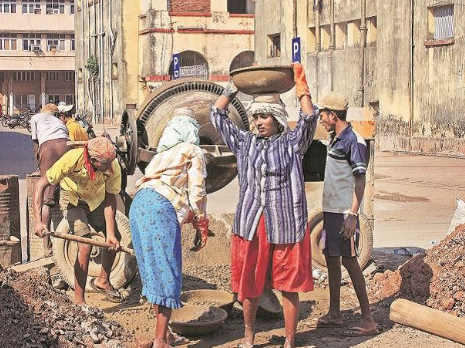COVID-19 Lockdown: Industrial Units Allowed to Reopen Struggle with Labour, Transport and Permissions in Maharashtra

Representational Image. Image Courtesy: Business Standard
Ganesh Dhole Patil owns a nut bolt factory in Kurkumbh industrial area of Pune district. He listened to Chief Minister Uddhav Thackeray as well as Industries Minister Subhash Desai on television when they spoke of lifting the lockdown for industrial activities in non-city areas. The Kurkumbh industrial area does not fall under any municipality or municipal council. So, he thought he could start his factory from April 20. He had closed it on March 23, after a complete lockdown was announced in Maharashtra.
"I sent my two jeeps to bring the labourers from the outskirts of Pune area. But the police didn't allow them to travel. They stopped my vehicles. They asked me to get passes. I don't know how many days it will take to get me the passes. So, I will have to wait until then to start my factory," said Dhole Patil.
Many rural industrial zones across the state have similar stories to narrate. Several of these, which are not in the cities, can provide work to a sizable population of labourers as well as revive the economy to some extent. But the attempts to do so by the factory owners are failing to get results.
The state government, while allowing these industries to function, has imposed the condition that the labourers will have to be brought using vehicles of the company and they must occupy only 30% of the capacity of each vehicle. “It is not possible for any industry to bring their workers like this. How many times that vehicle has to be ferried back and forth? Also, there are various other conditions because of which we won't be able to restart our business," said Satish Malu, the chairman of Krishna Valley Chambers of Industries.
All 150 members of Hind Kamgar Society of Karjat, Raigad go to the Vangani area of Thane district for work, commuting via trains. Fourteen of them work for a factory that makes plastic bottles. "Our contractor is asking us to come. But now, these are two different districts. We live in Raigad and the factory is in Thane. And we are not allowed to cross the district," said Haridas Bhingare, a member of the Hind Kamgar Society.
On the other hand, factory owners are now facing a number of issues including transport of the raw material to their factories. In Nanded's industrial zone, vehicles have to pass through the municipal area. But there are a number of restrictions on transportation of goods via municipal areas. Arun Autade has a chair factory in Nanded's outskirts. This part doesn't fall under the municipality. So, even though he can start the factory, he has trouble bringing raw plastic to the factory. He has applied online for a pass but hasn't received a response yet.
On the other hand, some factory owners have received passes for transportation. In Sinnar industrial zone of Nashik district, Saptashrungi fabricatures's Avinash Kokate is facing another issue. "Our labourers are mainly from Odisha and Andhra states. They went to their native places in March itself. I can't bring them back. So, I am struggling to find skilled labourers for the work," said Avinash.
Also read: COVID-19: Centre Seeks Resumption of Jute Mills in WB, CM Lowers Cap on Workforce
Get the latest reports & analysis with people's perspective on Protests, movements & deep analytical videos, discussions of the current affairs in your Telegram app. Subscribe to NewsClick's Telegram channel & get Real-Time updates on stories, as they get published on our website.
























